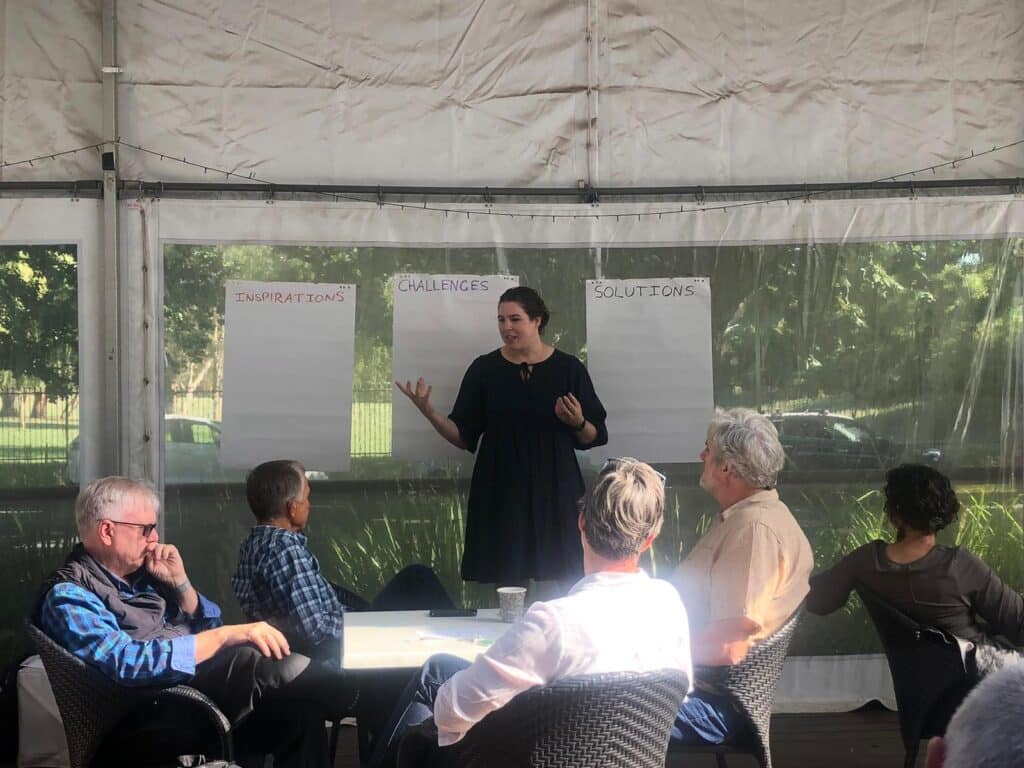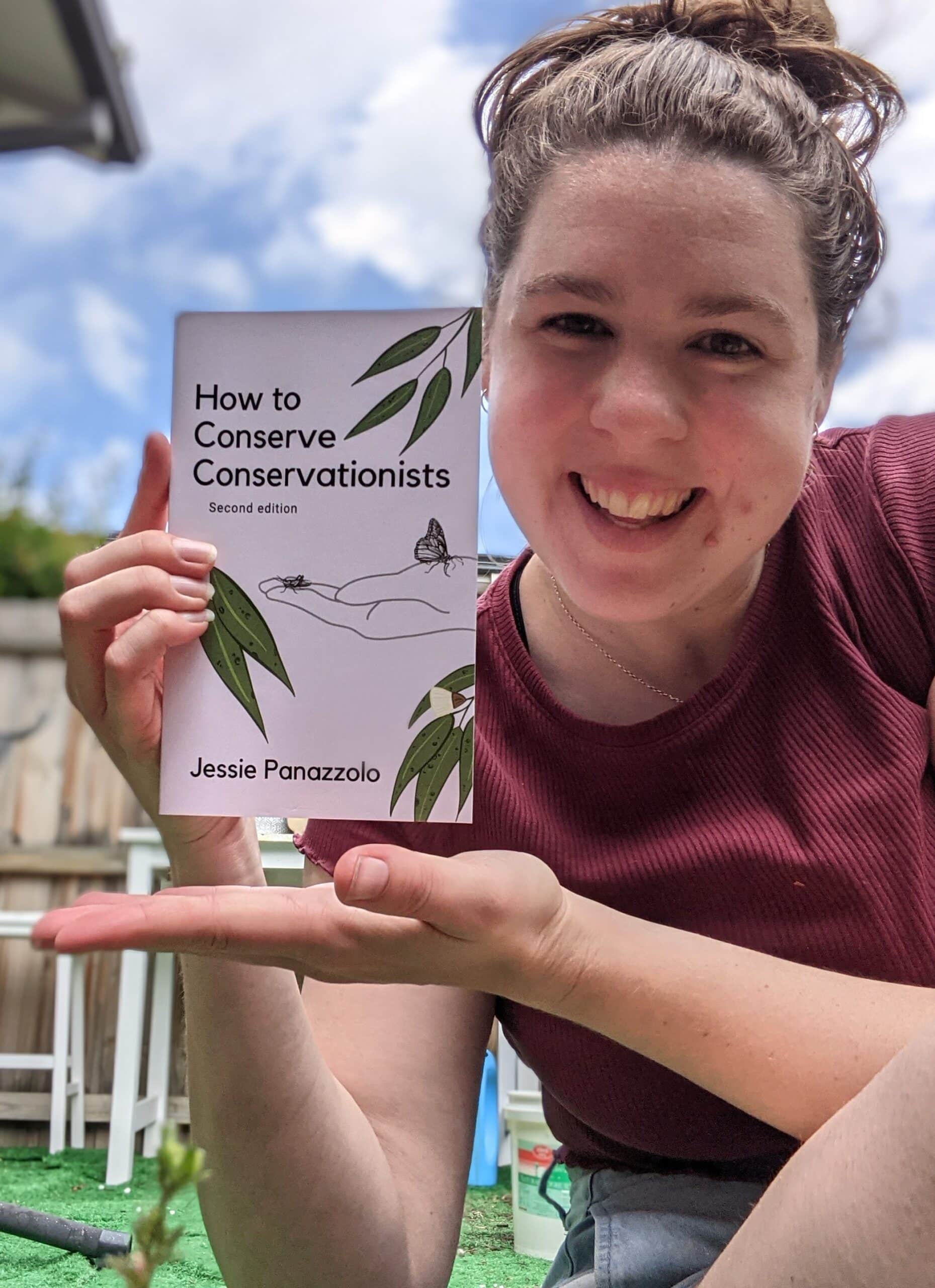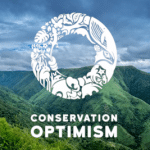Have you ever wondered how conservationists spend their days or what keeps them optimistic about the future of nature? Do they always spend their time in the distant wild, or might they be hidden all around us? Do their roles encompass aspects we never thought of?
“Meet The Optimists” is a monthly blog series by Conservation Optimism which introduces conservationists working in different fields and contexts to our readers. We discuss their journeys into conservation, typical daily activities and reasons for hope.
Read on for the inside story on different careers and fresh approaches to conservation!
In the September 2023 blog of Conservation Optimism’s “Meet The Optimists” series, Jessie Panazzolo takes us with her as she navigates the conservation world and all its intricacies as a sustainability educator and a conservationist conservationist.

Jessie Panazzolo with her book, How To Conserve Conservationists
“Hi, I’m Jessie, and I am many things. I am a bird nerd, sustainability educator, and a conservationist conservationist, meaning that I get great joy from caring for environmentalists and ensuring that they are valued and supported in their roles. I am the founder of Lonely Conservationists, author of How to Conserve Conservationists and cohost of the podcast of the same name.”
Can you trace the origins of your interest in conservation and what led to your current work?
My life as a conservationist started at the ripe old age of 3 years old when I was handed Sputnik, my stuffed gorilla. Sputnik inspired me to learn all about primates, and in my learning, I quickly understood that adults had made a mess of the forests and weren’t cleaning them up. By the time I was 5, I was asking my mum how I could save orangutans from the perils of deforestation and that simple question determined how the rest of my life played out. At age 24 I was conducting research on restored orangutan habitat in North Sumatra and living my childhood dreams. However, I soon realised the problem with my presence in Indonesia and that sustainable conservation efforts need to be initiated and undergone by locals to be truly effective and ongoing.
This meant that I had to start my life again at age 25 and work out what role I should play in the conservation world. I tried everything from koala conservation to sustainable tourism and bird research, only to be met consistently with toxic working environments, not enough pay to cover my rent and repeated bouts of burnout. One day I wondered if I was the only one struggling to establish myself in the conservation industry, as I only saw people’s amazing wildlife adventures on social media, magazines and documentaries.
Feeling like the loneliest conservationist in the world, I created a blog called Lonely Conservationists to tell my story. I was confident that breaking the facade of perfection would end any chance of a career once and for all, except that it did the opposite. Hundreds of conservationists from around the world came forth with their stories too and now there are over 6 thousand conservationists in our community! In a way, ending my career led me to make the best career decision of my life- it’s funny how life works out!
What does a typical day of work look like for you?
Although it is my dream to be a full-time conservationist conservationist, unfortunately, this is not a lucrative industry (or even an industry at all!). To sustain my livelihood, I balance Lonely Conservationists with the stability of full-time work as a sustainability educator for a local council.
Luckily for me, I take a 1.5-hour train commute to and from work, so there is a lot I can do in that time, like manage the Lonely Conservationists social media pages, Patreon, and blog, organise speaking opportunities, and chat with my community. I also meet with a lot of professionals from around the world who coach, research, work and play in the space surrounding the conservation of people. In line with this, I sit on a lived experience advisory committee for Connecting Climate Minds, a global research project intersecting climate change and mental health.
When I am lucky enough to have a speaking opportunity, it is usually at a weird time of the day because of time differences or availability. Because of this, I usually speak to people in the northern hemisphere at 6 a.m. before work or at 7-8 p.m. after work (this time is also common for fellow Australians). I present and run workshops for a range of conservationists, from university students to paid professionals and volunteers. In my sessions, I equip teams and individuals to guide them in understanding the challenges facing them within the industry and how they can advocate for the help they need to thrive within their roles.
What is your favourite and least favourite aspect about your role?
My least favourite aspect of running Lonely Conservationists is that I don’t get paid to advocate for conservationists full-time. I know that there is a lot of research being done at the moment surrounding climate change and mental health, and I see a huge need for education surrounding the resources that exist for the people on the front line. Being a conservationist is a caring role, yet, the industry doesn’t have the support that other caring roles such as psychologists and doctors have. Psychologists are able to see other psychologists and doctors still see doctors, however, there are currently minimal resources to care for conservationists, and I really wish I was equipped to do more. If anyone is able to help me to facilitate this, please reach out!
My favourite part about running Lonely Conservationists is the community. It is so wild to me that I thought I was the loneliest conservationist in the world, and now I have a global network of not-so-lonely conservationists by my side. When I moved to Melbourne in 2018, I didn’t know anyone, but now I have an incredible social circle stemming from Lonely Conservationist connections. I was in the UK earlier this year and met up with two community members, and it was as if we had been friends forever. The people in this community have really changed my life and I am so grateful for them every day.

As a conservationist, what makes you hopeful about the future?
I used to think that the whole world rested on my shoulders and that I had to fix all of the world’s problems myself. After meeting so many amazingly passionate conservationists, I now realise that there is a person for everything. There are ant people, slime mould people, tapeworm people and lilypad people. The fact that every genera of life on earth has at least one passionate advocate for its survival, allows me to sleep at night knowing that a lot of the natural world is being cared for.
What helps you stay positive day-to-day?
As a huge nerd, I love reading about all facets of nature, from the slime mould to the tapeworms. Learning about how incredible our world is and all that it holds within it reminds me that despite all the destruction, many species have evolved and adapted in so many weird and wonderful ways. Sharing weird facts with people also brings me joy- like, did you know a group of pandas is called an embarrassment? Well, now you do!
Could you share a story about a formative moment in your conservation career?
In 2015, I spent a month in a North Sumatran forest with a group of local men. I couldn’t speak a lick of their language, and that month was spent day in, day out, walking through the forest and trying to understand each other. By the end of the month, we had found a way to communicate, laugh, live and work together.
In 2016, I returned to North Sumatra to conduct my honours research, and I was walking through the forest with my two field staff. It was a hot day, and so they asked me if we could go by a village on the way back to the pondok (cabin) for a drink; I agreed eagerly as the surrounding oil palms had sucked the earth dry. On the way back from the village after our drink, I asked my field staff why there were no women drinking with us, and they said that it was a special men’s place. I motioned up and down towards my body and asked why I was allowed. They looked at me and laughed and said that I was different. This moment was so important to me because just 6 months ago, I couldn’t understand a word they said. I didn’t understand my place in the culture or know for certain my relationship with anyone. In that moment, I wasn’t just assimilated, I was accepted into the spaces that they were, and I had earned the respect that came along with that. This moment is one I will never forget and was one of the proudest moments of my career.
Any advice for someone interested in pursuing your field of work?
It is important to note that anyone who wants to be a conservationist can be. I believe that parents, doctors, lawyers, tradespeople, and architects can all be conservationists by integrating sustainable values into their day-to-day lives. Sometimes it’s even more important that conservationists live and work in non-environmental spaces so that all aspects of life can be transformed into something beneficial for our natural world.
I know that impostor syndrome is rife within environmental spaces, so just in case you weren’t sure, I want to validate your role as a conservationist. Participating in fieldwork or research isn’t suitable for everybody, mind or life circumstances. Just know that whatever you are able to contribute to this field is enough. Whether it be shopping second-hand, educating your friends and family, or integrating sustainable designs into your work or DIY projects- you are a completely valid conservationist!
Follow Jessie’s work on her Instagram and Lonely Conservationists here!


